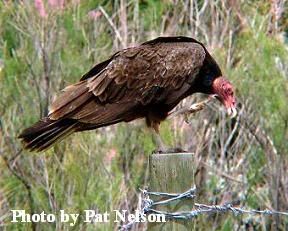 The Turkey Vulture Society is a non-profit scientific corporation. Its purpose is to promote scientific study of the life habits and needs of the Turkey Vulture, to protect the vulture and its habitat, and to inform the public of the valuable and essential services this bird provides to us and to the environment.
From their website, some interesting trivia:
+ Turkey vultures do NOT eat live animals. They will not hurt your pets or children.
+ A group of vultures is called a "Venue". Vultures circling in the air are a "Kettle".
+ American Vultures can smell, but African vultures cannot. The Turkey Vulture has the best sense of smell of the American vultures
+ Vulture poop is actually a sanitizer! Their uric acid is so strong (because of the nature of their diets) that it kills bacteria.
+ Vultures have excellent eyesight, but, like all other birds, they have poor vision in the dark. American vultures find food both with their eyesight and sense of smell.
+ Vultures prefer to eat fairly fresh meat. They will turn their nose up at rotten meat if there is any alternative available. They also prefer the meat of herbivorous animals, avoiding that of dogs and other carnivores.
+ The oldest known turkey vulture, Tolouse, is 33 years old, and lives at the San Francisco Zoo.
+ Circling vultures do not necessarily indicate the presence of a carcass. Circling vultures may be gaining altitude for long flights, searching for food, or playing.
+ Turkey vultures are attracted to the smell of mercaptan, a gas produced by the beginnings of decay.
+ Male and female turkey vultures are identical in appearance.
+ It is illegal to keep a vulture as a pet.
The Turkey Vulture Society is a non-profit scientific corporation. Its purpose is to promote scientific study of the life habits and needs of the Turkey Vulture, to protect the vulture and its habitat, and to inform the public of the valuable and essential services this bird provides to us and to the environment.
From their website, some interesting trivia:
+ Turkey vultures do NOT eat live animals. They will not hurt your pets or children.
+ A group of vultures is called a "Venue". Vultures circling in the air are a "Kettle".
+ American Vultures can smell, but African vultures cannot. The Turkey Vulture has the best sense of smell of the American vultures
+ Vulture poop is actually a sanitizer! Their uric acid is so strong (because of the nature of their diets) that it kills bacteria.
+ Vultures have excellent eyesight, but, like all other birds, they have poor vision in the dark. American vultures find food both with their eyesight and sense of smell.
+ Vultures prefer to eat fairly fresh meat. They will turn their nose up at rotten meat if there is any alternative available. They also prefer the meat of herbivorous animals, avoiding that of dogs and other carnivores.
+ The oldest known turkey vulture, Tolouse, is 33 years old, and lives at the San Francisco Zoo.
+ Circling vultures do not necessarily indicate the presence of a carcass. Circling vultures may be gaining altitude for long flights, searching for food, or playing.
+ Turkey vultures are attracted to the smell of mercaptan, a gas produced by the beginnings of decay.
+ Male and female turkey vultures are identical in appearance.
+ It is illegal to keep a vulture as a pet.
Friday, February 1, 2008
The Turkey Vulture Society
Subscribe to:
Post Comments (Atom)



No comments:
Post a Comment